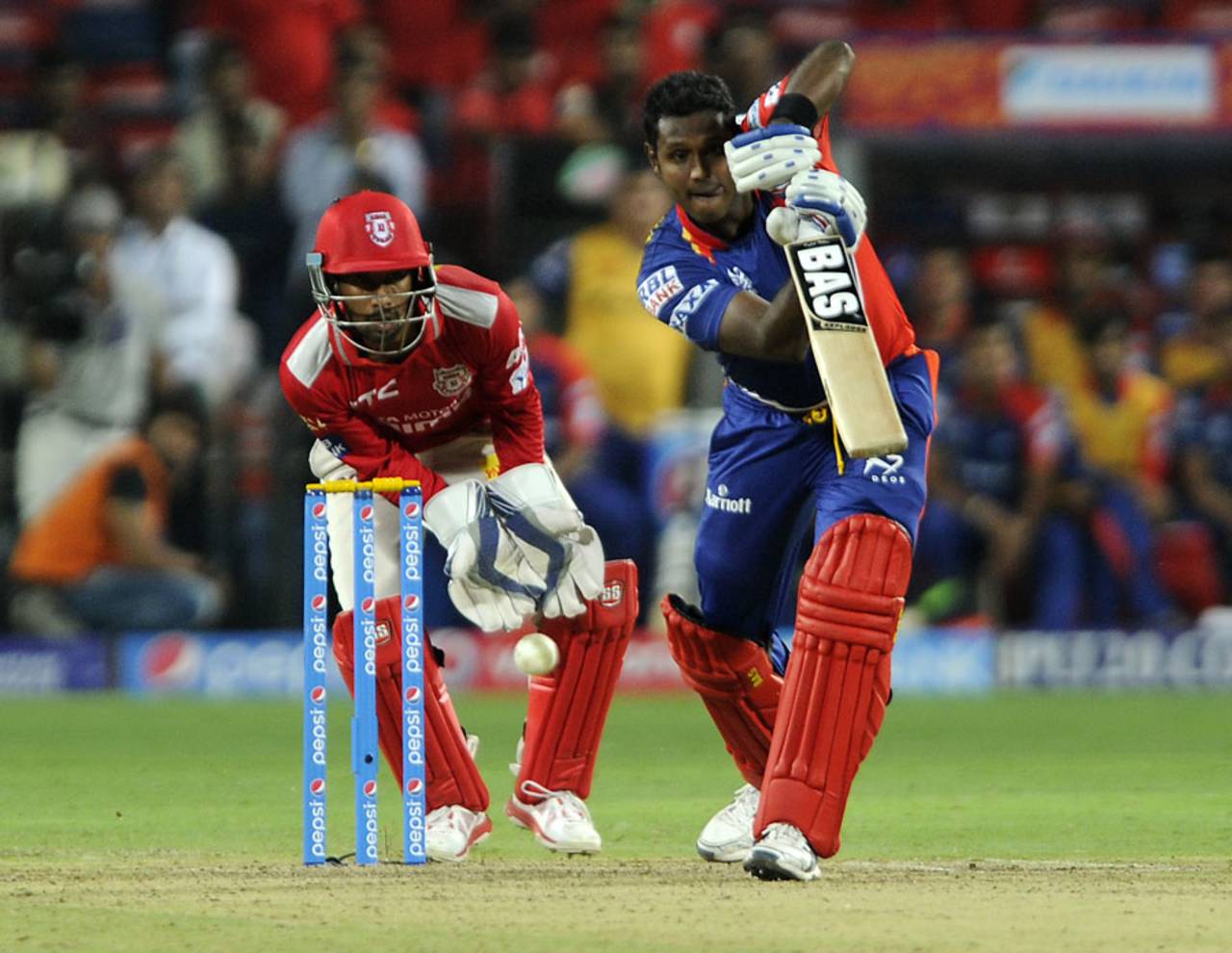The IPL's closed-door policy
The issue of Sri Lankan players not being allowed to play IPL games in Chennai does not impact too many games but to brush the issue away is to do disservice to the idea of sport and of a "level playing field"
Gaurav Kalra
Apr 17, 2015, 2:54 PM

If Angelo Mathews was one of Delhi Daredevils' first-choice overseas players for their season opener, they should have had the right to exercise it. • BCCI
On April 9, when Chennai Super Kings hosted Delhi Daredevils in the second game of IPL 2015, one sidelight went largely unnoticed. Daredevils were not allowed to select a player from their squad in the playing XI even though he was fit and available. He couldn't even get on the flight to Chennai with the rest of his team-mates.
Angelo Mathews is Sri Lankan. He is not allowed to enter the state of Tamil Nadu.
This isn't new. In 2013, the state government ordained that IPL matches in Chennai could only go ahead if Sri Lankan players, umpires, coaches and support staff associated with the teams do not travel to the city. "Escalating tension over treatment of ethnic Tamils in Sri Lanka" was the reason cited. There was the mandatory media outrage but the IPL bowed its head and accepted the diktat.
Two years on, status quo remains. "No Sri Lankan cricketers would be allowed to play in Chennai this time also," said Tamil Nadu Cricket Association secretary Kashi Viswanathan ahead of the game against Daredevils. "The matter has been informed to the IPL governing council."
An IPL insider confirms that while there is no written instruction from the state government, the IPL has chosen to exercise "caution" and "restraint" on the issue. "Franchises were aware of the situation at the time of the auction," he says. "We cannot be taking chances with the security of individual players."
The larger point isn't whether the absence of these players weakens their teams or not. It is about the choice of their selection itself being withdrawn from the hands of those meant to make it.
The essence of this situation isn't so much the practical fallout on the actual tournament itself - only three Sri Lankan players are part of the IPL this time around as opposed to 13 when the issue first came to a head two years ago. Only three games will be impacted and over a league phase where each team plays 14 matches. That is a miniscule number. So why make a fuss at all?
To brush it away is to do disservice to the idea of sport and of a "level playing field". No competition can claim to be fair if it commands one of the two combatants involved to put anything but their best foot forward. Every time. Everywhere.
If Mathews was one of Daredevils' first-choice overseas players for their season opener, they should have had the right to exercise it. Why must Mumbai Indians be forced to take the field without Lasith Malinga when they travel to Chennai for their game on May 8? Why should Kings XI Punjab not have the option to field Thisara Perera if they so wish for their game against Super Kings on April 25? The larger point isn't whether the absence of these players weakens their teams or not. It is about the choice of their selection itself being withdrawn from the hands of those meant to make it.
It does appear that the IPL has chosen the convenience and comfort of maintaining status quo over the tougher option of attempting to change the local government's mind. A sporting competition must place its credibility over all else. At the very minimum, it must attempt to restore imbalances that may have crept in due to extraordinary circumstances. Perhaps an emissary could have been sent to the chief minister to end the impasse. Perhaps the offices of strong political voices who are part of the BCCI could have been used? No such move seems to have been even contemplated.
Beyond the cricket, the larger message emerging from this scenario is troubling. How does the mere presence of a cricketer of a certain ethnicity undermine a larger cause by simply batting, bowling and fielding? Must competitive politics be allowed to dictate such discrimination?
The IPL is a showpiece Indian product, a glitzy reflection of the ever-growing might of the country as a global economic power. For a couple of months every year, South Africans, Australians, New Zealanders, Sri Lankans and West Indians are Daredevils from Delhi, Super Kings from Chennai, Royals from Rajasthan and the like. It loosens its substantial purse strings to engage talent, based purely on their skill sets, not on which part of the globe they come from.
When one part of that same country shuts its doors down on a group of individuals based on nothing other than their origin, it can't simply be met by a shrug of the shoulders.
Gaurav Kalra is a senior editor at ESPNcricinfo. @gauravkalra75